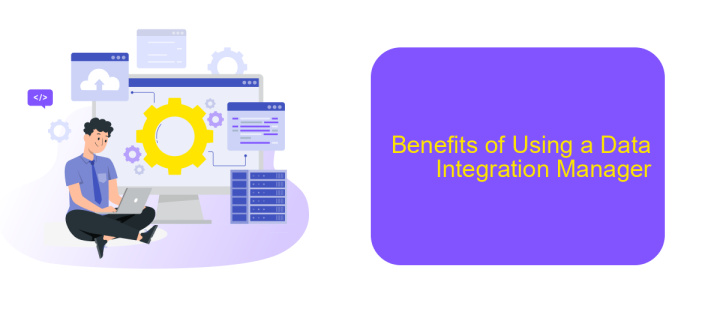Data Integration Manager
A Data Integration Manager plays a crucial role in modern businesses by overseeing the seamless integration of data from various sources. They ensure that data flows efficiently across systems, enabling informed decision-making and operational efficiency. This role requires a blend of technical expertise and strategic vision, making it essential for organizations aiming to leverage data as a valuable asset.
Introduction
Data Integration Manager plays a crucial role in today's data-driven world, ensuring seamless connectivity and synchronization between various data sources and applications. With the exponential growth of data, organizations face the challenge of integrating disparate data systems to gain comprehensive insights and make informed decisions. A robust Data Integration Manager streamlines this process, enhancing data accuracy, consistency, and accessibility.
- Streamlines data synchronization across multiple platforms
- Ensures data accuracy and consistency
- Facilitates real-time data access and analysis
One of the tools that can significantly aid in data integration is ApiX-Drive. This service allows users to set up integrations effortlessly, connecting various applications and automating data flows without the need for coding. By leveraging such tools, organizations can focus on their core activities, confident that their data is integrated and up-to-date, thus driving better business outcomes.
Data Integration Challenges

Data integration presents numerous challenges, primarily due to the diverse nature of data sources and formats. Ensuring data consistency and accuracy across different systems can be a complex task, as discrepancies in data formats and structures often lead to integration issues. Additionally, managing data in real-time while maintaining performance and reliability is a significant hurdle. Security concerns also arise, as integrating data across multiple platforms increases the risk of data breaches and unauthorized access.
Another challenge is the scalability of data integration solutions, as businesses grow and their data needs evolve. Traditional methods may struggle to keep up with increasing data volumes and complexity. Tools like ApiX-Drive can help mitigate these challenges by offering automated and scalable data integration services. ApiX-Drive simplifies the process by providing a user-friendly interface to connect various applications and data sources, ensuring seamless data flow and reducing the potential for errors. This enables businesses to focus on their core operations while maintaining efficient and secure data integration.
Data Integration Manager

Data Integration Managers play a crucial role in modern businesses by ensuring seamless data flow between various systems and applications. They are responsible for designing, implementing, and managing data integration solutions that enable organizations to leverage their data effectively. These professionals must understand the intricacies of data sources, data transformation, and data loading processes to maintain data integrity and consistency.
- Identify data sources and establish connections.
- Transform data to meet business requirements.
- Load data into target systems accurately.
- Monitor and troubleshoot integration processes.
- Ensure data security and compliance.
One of the tools that can significantly aid Data Integration Managers is ApiX-Drive. This service simplifies the integration process by providing a user-friendly interface for connecting various applications without the need for extensive coding. ApiX-Drive supports numerous platforms, enabling businesses to automate data transfers and improve operational efficiency. By leveraging such tools, Data Integration Managers can focus on strategic tasks, ensuring that data integration aligns with organizational goals and drives business growth.
Benefits of Using a Data Integration Manager

Implementing a Data Integration Manager can significantly streamline your business processes by ensuring seamless data flow across various systems. This tool acts as a central hub, allowing disparate data sources to communicate efficiently, thereby enhancing data consistency and accuracy.
One of the primary benefits of using a Data Integration Manager is the reduction of manual data entry, which minimizes the risk of human error. With automated data synchronization, businesses can save time and resources, allowing employees to focus on more strategic tasks.
- Enhanced data accuracy and consistency
- Reduction in manual data entry and associated errors
- Improved decision-making through real-time data access
- Cost and time savings through automation
- Scalability to accommodate growing data needs
Services like ApiX-Drive simplify the integration process by providing user-friendly tools to connect various applications and platforms. With features like automated workflows and real-time data updates, ApiX-Drive ensures that your data integration is both effective and efficient, catering to the dynamic needs of modern businesses.
- Automate the work of an online store or landing
- Empower through integration
- Don't spend money on programmers and integrators
- Save time by automating routine tasks
Conclusion
In conclusion, the role of a Data Integration Manager is pivotal in ensuring seamless data flow and coherence across various platforms within an organization. By effectively managing data integration processes, businesses can achieve higher efficiency, improved data accuracy, and better decision-making capabilities. The integration of diverse data sources allows for a comprehensive view of business operations, facilitating strategic planning and operational effectiveness.
Utilizing tools like ApiX-Drive can significantly simplify the process of setting up and managing integrations. ApiX-Drive offers an intuitive platform that connects various applications and automates data transfer, reducing the need for manual intervention and minimizing errors. By leveraging such services, organizations can enhance their data integration strategies, ensuring that data is consistently up-to-date and accessible across all systems. This not only streamlines operations but also empowers teams with reliable data to drive innovation and growth.
FAQ
What is Data Integration Manager?
How does Data Integration Manager work?
What are the benefits of using a Data Integration Manager?
Can I automate data integration tasks?
How do I set up data integrations without coding skills?
Do you want to achieve your goals in business, career and life faster and better? Do it with ApiX-Drive – a tool that will remove a significant part of the routine from workflows and free up additional time to achieve your goals. Test the capabilities of Apix-Drive for free – see for yourself the effectiveness of the tool.


